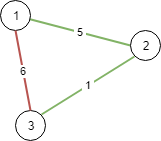There are n cities labeled from 1 to n. You are given the integer n and an array connections where connections[i] = [xi, yi, costi] indicates that the cost of connecting city xi and city yi (bidirectional connection) is costi.
Return the minimum cost to connect all the n cities such that there is at least one path between each pair of cities. If it is impossible to connect all the n cities, return -1,
The cost is the sum of the connections' costs used.
Example 1:
Input: n = 3, connections = [[1,2,5],[1,3,6],[2,3,1]] Output: 6 Explanation: Choosing any 2 edges will connect all cities so we choose the minimum 2.
Example 2:
Input: n = 4, connections = [[1,2,3],[3,4,4]] Output: -1 Explanation: There is no way to connect all cities even if all edges are used.
Constraints:
1 <= n <= 1041 <= connections.length <= 104connections[i].length == 31 <= xi, yi <= nxi != yi0 <= costi <= 105
class Solution:
def minimumCost(self, n: int, connections: List[List[int]]) -> int:
def find(x):
if p[x] != x:
p[x] = find(p[x])
return p[x]
connections.sort(key=lambda x: x[2])
p = list(range(n))
ans = 0
for x, y, cost in connections:
x, y = x - 1, y - 1
if find(x) == find(y):
continue
p[find(x)] = find(y)
ans += cost
n -= 1
if n == 1:
return ans
return -1class Solution {
private int[] p;
public int minimumCost(int n, int[][] connections) {
Arrays.sort(connections, Comparator.comparingInt(a -> a[2]));
p = new int[n];
for (int i = 0; i < n; ++i) {
p[i] = i;
}
int ans = 0;
for (int[] e : connections) {
int x = e[0] - 1, y = e[1] - 1, cost = e[2];
if (find(x) == find(y)) {
continue;
}
p[find(x)] = find(y);
ans += cost;
if (--n == 1) {
return ans;
}
}
return -1;
}
private int find(int x) {
if (p[x] != x) {
p[x] = find(p[x]);
}
return p[x];
}
}class Solution {
public:
int minimumCost(int n, vector<vector<int>>& connections) {
vector<int> p(n);
iota(p.begin(), p.end(), 0);
sort(connections.begin(), connections.end(), [](auto& a, auto& b) { return a[2] < b[2]; });
int ans = 0;
function<int(int)> find = [&](int x) -> int {
if (p[x] != x) {
p[x] = find(p[x]);
}
return p[x];
};
for (auto& e : connections) {
int x = e[0] - 1, y = e[1] - 1, cost = e[2];
if (find(x) == find(y)) {
continue;
}
p[find(x)] = find(y);
ans += cost;
if (--n == 1) {
return ans;
}
}
return -1;
}
};func minimumCost(n int, connections [][]int) (ans int) {
p := make([]int, n)
for i := range p {
p[i] = i
}
sort.Slice(connections, func(i, j int) bool { return connections[i][2] < connections[j][2] })
var find func(int) int
find = func(x int) int {
if p[x] != x {
p[x] = find(p[x])
}
return p[x]
}
for _, e := range connections {
x, y, cost := e[0]-1, e[1]-1, e[2]
if find(x) == find(y) {
continue
}
p[find(x)] = find(y)
ans += cost
n--
if n == 1 {
return
}
}
return -1
}function minimumCost(n: number, connections: number[][]): number {
const p = new Array(n);
for (let i = 0; i < n; ++i) {
p[i] = i;
}
const find = (x: number): number => {
if (p[x] !== x) {
p[x] = find(p[x]);
}
return p[x];
};
connections.sort((a, b) => a[2] - b[2]);
let ans = 0;
for (const [x, y, cost] of connections) {
if (find(x - 1) == find(y - 1)) {
continue;
}
p[find(x - 1)] = find(y - 1);
ans += cost;
if (--n == 1) {
return ans;
}
}
return -1;
}

